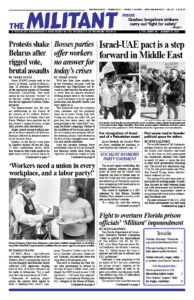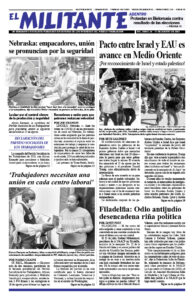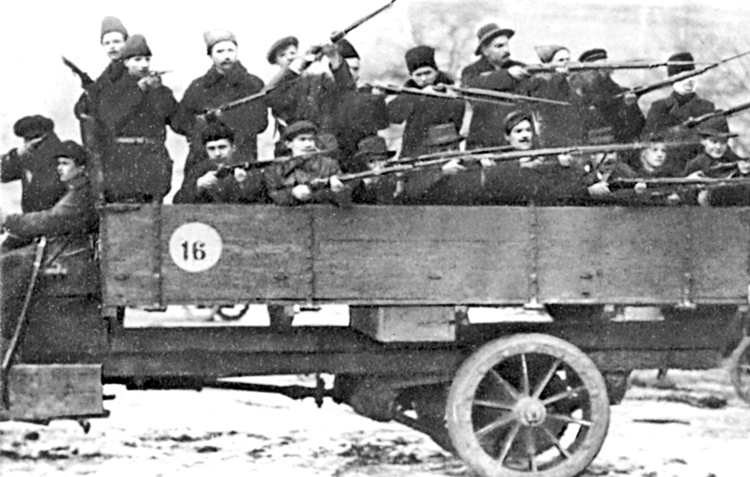Speeches for Socialism by James P. Cannon is one of Pathfinder’s Books of the Month for August. A young working-class fighter inspired by the 1917 October Revolution led by the Bolsheviks, he was a founding leader of the U.S. Communist Party and a member of the Executive Committee of the Communist International under V.I. Lenin. Expelled from the by now Stalinist-controlled CP, he and others, determined to continue the course of Lenin, founded the Militant newspaper in 1928. Cannon was national secretary of the Socialist Workers Party from 1938 to 1953. The excerpt is from his 1942 speech, “The Twenty-Fifth Anniversary of the Russian Revolution.” Copyright © 1969 by Pathfinder Press. Reprinted by permission.
We meet on the twenty-fifth anniversary of that great day when the world-encircling chain of imperialism snapped at its weakest link, and the workers of Czarist Russia, supported by the peasants, broke through to victory and established the first workers’ state. We are meeting tonight, as we and our kind have been meeting on each succeeding anniversary throughout the years since 1917, as partisans and defenders of the Russian Revolution and of the workers’ state which the Russian Revolution created.
We are not alone today. The whole world is taking notice of the USSR on this anniversary. Everybody is recognizing the Soviet Union, each in his own way. Churchill, who tried his best to overthrow it in the early days, and Roosevelt, who — to judge by the indictment which his administration drew up against us1 — was, to say the least, not very friendly to the Russian Revolution — Churchill and Roosevelt pay hypocritical tribute today to “the great Russian people” and “the heroic Red Army.” Hitler looks toward the East through dark glasses tonight, with fear and trembling, wondering whether his insane dream of empire hasn’t been shattered on the Russian front.
Remembering the Russian Revolution of 1917, the workers of Europe and the colonial slaves lift up their hearts in hope once more today. Each in his own way, for reasons of his own, takes notice of this twenty-fifth anniversary. But the differences in the reasons — and they are whole worlds apart — change nothing in the decisive fact that everybody is saluting, recognizing, or cursing a state and an army that issued from a victorious revolution of the workers. This revolution is in the greatest crisis of its entire history at this hour, in its greatest peril. We know this and we say it openly.
And we say also, and with truth, that in its greatest crisis and danger, we Fourth Internationalists, we disciples of Lenin and Trotsky, remain the best defenders of the Soviet Union. The fact that we are celebrating the revolution and not announcing its funeral shows that we are still fighting. We are fighting for a revolution that is still living.
War and revolution are the most authoritative of all tribunals. It is there, in war and in revolution, that all the great questions are decided in our epoch. The outbreak of the First World War in August 1914 demonstrated that capitalism, as an economic and social system, had exhausted its progressive historic mission. The Russian Revolution of November 1917 served notice that a more powerful class than the class of capitalists had come to maturity. The modern proletariat, the progressive force in modern society, the herald and representative of a new social order — this class, as demonstrated by the revolution, took the offensive in the class battle that can only end in worldwide victory.
November 7, 1917. The death sentence on the old order of capitalism and the beginning of the new order of world socialism were both proclaimed on that day. And whatever vicissitudes, whatever setbacks, betrayals or defeats may overtake the proletariat on the road to that final goal; however sharp and deep may be the zigzags in the line which charts the course of the struggle through which humanity shall pass from capitalism to socialism; whatever may befall: the starting point in the line of development will always be traced to that great day which we commemorate tonight — November 7, 1917.
I can remember the dark days of the First World War, 1914-1918. Then as now, all the hopes for humanity’s progress seemed to be drowned in the blood of the war. Reaction seemed to be triumphant everywhere. The enemies of the proletariat gloated over the treachery and capitulation of the socialist parties. … The whole world labor movement was overcome with depression and despair in 1914-1917.
But the Russian Revolution of November 7 changed all that overnight. At one blow, the revolution lifted the proletariat of Europe to its feet again. It stirred the hundreds of millions of colonial slaves who had never known political aspiration before, who had never dared to hope before. The Russian Revolution awakened them to the promise of a new life.
Here in the United States, the progressive sections of the socialist and labor movements were reinvigorated by the Russian Revolution. The morale of the movement grew stronger than ever before. For the first time, concentrated in revolutionary action, we had a demonstration of the real meaning of the doctrines of Marxism. For the first time we learned, from the example and teachings of Lenin and Trotsky and the leaders of the Russian Revolution, the real meaning of a revolutionary party. …
Marx and Engels lifted the conception of socialism from utopia to science. The Russian Revolution developed scientific socialism from theory into action, and proved several things that before had been abstract generalizations and predictions. The Russian Revolution proved in action that certain things were true beyond all further doubt. The first of these things proved by the revolution was that it is possible for the workers to take power. It is possible for the workers to forge out of their ranks a party that is capable of leading the struggle to victory. And the workers in all countries will everlastingly remember that. Nothing can erase from history that example. Victory of the proletariat is possible — the Russian Revolution in action, in blood and fire, proved that it is so.
- Cannon was one of 18 leaders of SWP and Minneapolis Teamsters union imprisoned on charges of conspiring to advocate overthrow of the U.S. government. Their real “crime” was organizing opposition within the labor movement to the U.S. rulers’ drive to enter World War II.


